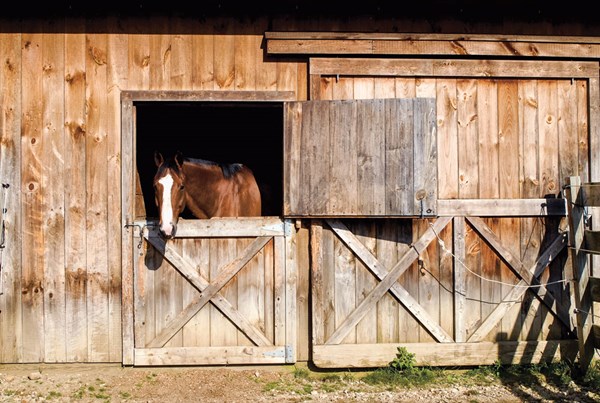 The more isolating a horse’s stabling situation, the more his health and attitude may be affected negatively. | © Dusty perin
The more isolating a horse’s stabling situation, the more his health and attitude may be affected negatively. | © Dusty perinYou leave your horse in his box stall knowing he has room to stretch out, clean bedding and plenty of fresh water and hay. It’s a five-star setup, and you’re sure he’ll be safe and comfortable there. But in fact, he may be stressed out—and the more his stabling arrangement limits his contact with other horses, the more stressed he’ll be.
Being with others is so important for horses that solo stabling can be harmful to their health and well-being, a study at Nottingham Trent University in Britain shows. “Social housing designs provide a much better standard of equine welfare,” says Dr. Kelly Yarnell, the lead researcher. Dr. Yarnell and her team looked at the effects of four different horse-housing arrangements:
• Individual box stalls with solid brick walls to the rear and side so no contact with other horses was possible.
• Individual box stalls with a solid rear wall but side and front walls that included vertical metal bars so the horse could see, hear and touch noses with neighbors on each side.
• Paired with another horse in a barn so the two horses had full physical contact with each other. The paired horses also could see and hear horses stabled in nearby box stalls and in an adjacent enclosure.
• With three other horses in a dirt paddock. Horses in each group of four had full contact with one another and could see and hear horses in nearby paddocks.
The 16 horses in the study group spent five days in each of the four housing types with two days turned out on grass between the shifts. During each period, researchers tested manure to detect levels of stress hormones and used a thermal camera to gauge the horses’ eye temperature, which tends to rise with stress. On the final day of each period they used a remote video camera to record the horses’ behavior for seven hours. After analyzing the video, they assigned each horse an ease-of-handling score.
As housing became more isolated, the horses’ eye temperatures and levels of fecal stress hormones rose. The horses also became increasingly difficult to handle. They showed the fewest markers of stress when they were kept in groups, the researchers report.
People keep horses in stalls for safety and convenience, and given the realities of 21st-century horsekeeping, that’s not likely to change. But this research suggests that your horse’s health and attitude will benefit from time spent schmoozing and rubbing shoulders with others of his kind.
This article originally appeared in the June 2015 issue of Practical Horseman.










